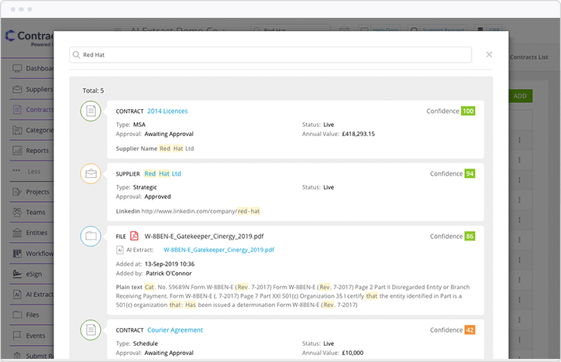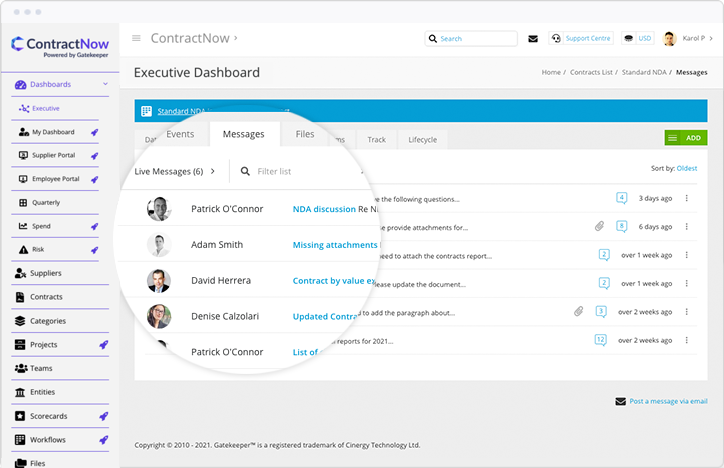Contract compliance is the cornerstone of any successful business. It ensures your business and its suppliers comply with local and regulatory legislation. It also ensures that obligations are being fulfilled by all parties involved in any agreement. Problems, penalties and non-compliance occur when your business:
- Lacks awareness of obligations agreed to by each party
- Is unaware of expired certificates or out-of-date information from third-parties, which may or may not be legally-mandated
- Fails to continuously monitor contracts and obligation fulfilment
Businesses that experience the issues above often have fragmented and manual processes in place. The digitisation of contract management, through the use of dedicated software, helps these businesses to overcome such challenges.
“Technology cannot only deliver cost savings, enhance compliance and de-risk the legal function but it can also help deliver on CEOs’ priorities around data-driven risk management and improving business enablement.” -
Cornelius Grossmann, EY Global Law Leader.
In this article, we’ll show you how contract management software can improve your contract compliance and protect your business.
What is contract compliance and why is it important?
Contract compliance is achieved when all parties involved in an agreement fulfil and abide by the terms and conditions set out in the contract. These terms and conditions can be set internally, but all agreements must also abide by external conditions set by local regulators, governments and industry boards.
By complying in each of these areas, your business protects itself from:
- Value erosion where what’s agreed is not delivered
- Exposure to financial penalties,
- Operational disruption
- Supplier disruption
- A loss of trust from its customer and vendor base.
Three contract compliance tips for your business
Contract compliance belongs to the entire organisation which means all stakeholders need to have access to, and the ability to share, up-to-date information. But to obtain this information in the first place, your business needs to have the right tools and processes in place.
Below, we provide three contract compliance tips that you can follow and implement throughout your business. We also take a look at how contract management software supports your compliance efforts, helping you to minimise future risk throughout your portfolio.
1. Improve awareness of internal and external obligations
Ensuring compliance with internal and external contract obligations requires shared knowledge across the business of what those obligations are.
If at any point an obligation looks like it may not be fulfilled, or a third-party’s business practices are falling short of externally legislated requirements, it’s time to stop and take remedial action.
But to be able to take this remedial action - and early enough that it makes a positive impact - your business needs to have an awareness of what has been agreed to and what regulations are in place.
Let’s take a look at some examples of both types of obligations.
Internal:
- When a supplier should deliver goods or services by
- When your business should pay any invoices by
- The contract change request that should be followed if needed
- Mandatory use of supplier if outlined for certain products
External:
- Regulatory regimes such as GDPR, HIPAA or CCPA
- Local laws based on where the organisation operates
- Governing Laws from where the organisation is headquartered
- The nature of what data is processed, how and where
Businesses that experience non-compliance issues are often businesses that experience a lack of visibility and searchability of their contracts."
If your business can’t find information related to internal and external obligations, it simply can’t guarantee compliance and immediately exposes itself to all sorts of risks.
Extracting key information, such as clauses and important dates, and storing them all in a centralised and searchable repository will help your business to gain awareness of all its obligations.
 Easily search for contract obligations within ContractNow
Easily search for contract obligations within ContractNow
Contract management software allows you to automatically extract metadata, removing the potential for manual error and data duplication. Automating this task and making data easy to search not only saves time, but provides access to accurate information.
The information extracted from the approved contracts needs to be periodically reviewed, because regulations and legislation continually change. If you fall behind in keeping records up-to-date, you could cause instances of non-compliance.
2. Track key dates and define follow-up processes
Compliance with internal and external obligations can easily fall short if your business is leaving its contract portfolio to operate in the background. A lack of visibility of key dates - whether that’s a contract expiring or a service being delivered within an agreed date - naturally lends itself to an increased risk of non-compliance.
Contract compliance requires proactivity from stakeholders. Businesses that respond reactively are likely too far behind and already non-compliant."
By knowing what service is due from a supplier and when, when compliance certificates are due for renewal or when industry legislation will change businesses can take early action.
Engaging with stakeholders, third parties and contract owners, businesses can close any gaps that could lead to instances of non-compliance.
Tracking key dates is only possible when you are able to easily capture, record and store this metadata in an accessible system. The dates should also be actionable - triggering a response from those in charge of the contract. After all, knowledge of dates is just knowledge unless something is done with the information.
Track key dates and receive alerts for upcoming events
Contract management software allows you to automatically extract key dates and use them to set triggers, alerting the relevant person that action is required. This brings compliance to the forefront of any contract management strategy by preventing business disruption, assumptions that supplier information is up-to-date and crucial documents expiring.
3. Prioritise contract monitoring to ensure obligations are fulfilled
Key dates are a great start when it comes to contract tracking, but non-compliance has the chance to creep into your portfolio if you’re not keeping a watchful eye on the end-to-end process. Has a supplier recently gone quiet? Is performance not as expected? Are you having to chase information too close to a deadline? These are a few things to keep in mind.
If there isn’t an individual within your business who can provide an informed answer to the above, contract monitoring may not be taking place - let alone being prioritised."
To make contract monitoring a priority there are a few steps you should take including:
- Assigning ownership of a contract to a named individual
- Building in sufficient time for periodic contract reviews
- Communicating about contracts and their statuses more regularly
By assigning responsibility for contract monitoring and making it the expectation rather than the exception, stakeholders are immediately held accountable for compliance. Giving them the opportunity to review crucial elements of a contract’s operation such as performance against agreed targets will ensure that monitoring becomes a standardised process.
When contracts are being monitored, it’s important that the most up-to-date information is shared. If methods of communication are fragmented throughout the business - such as emails not being seen by key stakeholders - you’ll need to make a change.
Achieving contract compliance should be a collaborative process so internal communication needs to be seamless.
Digestible information via visualised reports, customised dashboards and communication via a centralised messaging system can all help teams work together to raise non-compliance issues and resolve them.
 Centralise internal and external messaging for seamless collaboration
Centralise internal and external messaging for seamless collaboration
This lets the entire business know where it stands and come together to mitigate the event early on - and learn from the experience in the future.
Wrap Up
Improving contract compliance protects your business from reputational damage. It also prevents any damage to your bottom line via financial penalties. And it can make third parties eager to continue doing, or start new, business with you.
It is a core part of any successful contract management strategy and key to operational effectiveness.
You don’t know what you don’t know, and if you don’t know where your contracts are or what the state of compliance is across your entire portfolio, you’re heading towards danger."
Contract compliance relies on visibility, early action and seamless collaboration. If you’re ready to start making improvements and see how ContractNow could help, get in touch today.



